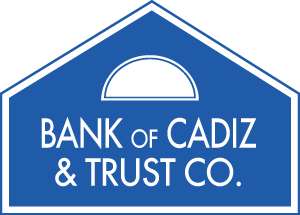Information security is defined as, the "practice of defending information from unauthorized access, use, disclosure, disruption, modification, perusal, inspection, recording or destruction". Bank of Cadiz & Trust Co. maintains an ongoing process by which information assets are protected which includes methods such as customer authentication. These methods are necessary to maintain trust between Bank of Cadiz & Trust Co. and its customer; to uphold compliance with the law ensuring the security and confidentiality of customer information; and to protect against unauthorized access to or use of such information or records that could result in substantial harm or inconvenience to any customer or the Bank.
Some of Bank of Cadiz & Trust Co. online security measures include:
- Encryption of electronic customer information
- Outgoing email is encrypted when sensitive data is being sent
- Online Banking utilizes multi-factor authentication
- The Bank adheres to the guidelines set forth in the Electronic Funds Transfer Act (Reg E) which establishes the basic rights, liabilities and responsibilities of consumers who use electronic funds transfer services, as well as the Graham, Leach, Bliley Act (GLBA) standards of confidentiality.
- The Bank uses only authorized vendors who are familiar with our systems and security and with which we have agreements in place.
Additional Risk controls that customers may consider:
- Review your account activity and statements frequently. Promptly report any errors or unauthorized transactions.
- Notify the Bank immediately if you believe your access information has been compromised.
- Do not give out personal information over the phone, through the mail or on the internet unless you have initiated the contact and are sure you know who you're dealing with. If you must share personal information, confirm that you are dealing with a legitimate organization. If you receive a phone call or email asking you to verify information, end the call, do not respond, and call the bank directly. Recent fraud scams use the practice of "pretext calling" where individuals claim to be a representative from a financial institution and ask to verify your personal information. Your financial institution already has your information on file and will never ask for your verification.
- Update the virus protection software on your PC regularly; and maintain current patches to operating systems and browsers.
- Protect your PINS and computer passwords; use a combination of letters and numbers (the longer and more complex a password is, the stronger it is and change them often. Never have this information where others may gain access to it. Do not use any part of your Social Security number, birth date, middle name, spouse's or child's name, mother's maiden name, address, or consecutive numbers. Instead, use something unique that only you know. Shield the keypad when using ATMs or when using debit cards at point of sale. Logoff Online Banking/Mobile Banking when you are finished.
- Watch out for email related scams such as Phishing. Phishing occurs when a web page is copied or imitated. Users are misled into providing personal information. If you receive an email asking for personal information, do not hit the reply button or click on any website link in the email. Instead, go directly to the sender's website by typing in the sender's website address. For more information on phishing, visit http://www.antiphishing.org. This link is to the Anti-Phishing Working Group, a trade association that includes Law-enforcement officials. This site explains what "Phishing" is and offers advice on how to avoid becoming a victim.
- Do not open files from strangers or companies you don't know.
- Prevent the chances of spyware from being downloaded on your computer. Install and periodically update anti-spyware, virus protection and firewall software.
- Carefully read all End User Licensing Agreements and avoid downloading software when licensing agreements are difficult to understand.
Bank of Cadiz & Trust Co. will never contact a customer via phone, email, fax or text to request Online Banking credentials, SSN, PIN, password, account numbers, user names, etc. Should you suspect fraudulent activity on your account, contact us immediately at 270.522.6066 or 866.554.6066.


